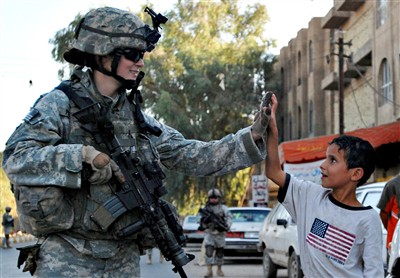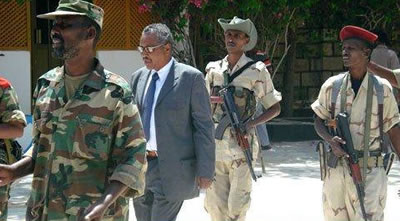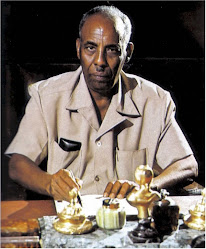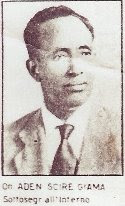It is Farole’s trademark to threaten the TFG when he faces a political obstacle. In this instance, he was refused attendance at the conference where all the major donors and stakeholders of Somalia would be present. He described the decision by Sharif to refuse his attendance at the Djibouti conference as a “diplomatic incident”. The TFG and Puntland do not have diplomatic ties (they are both part of Somalia ) and Farole needs to understand that Puntland is a regional administration that comes under the jurisdiction of Somalia. As such, Sharif is in fact Farole’s President with Farmajo being his Prime Minister.
He seems to lack basic diplomacy skills and political experience and his outbursts in the media are not consistent with those of a high level official who wishes to command respect and wants to be taken seriously on the international political scene. (Farole resorted to name calling during the interviews he gave to local radio stations; the last epithet he used to describe PM Farmaajo’s comments was “idiotic”.)
Much like a child refused candy at the store, he throws a temper tantrum and screams until he gets the attention of all those surrounding him. The candy in this instance is the aid given to Somalia by the International Community. Comical Daud mentioned the lack of accountability and fairness with regards to the international aid Somalia receives via Mogadishu. As stated in the press release, Farole resented “the marginalization of Puntland from the international community’s initiatives and funding intended for the reconstruction and development of Somalia as a whole”.
Who is truly marginalized?
Before pointing fingers at the TFG, it would be in the best interest of Puntland to look into its own administration and show us wherein lie the accountability and fairness, when it comes to the distribution of international aid and NGOs. In this instance, it would be wise for Comical Daud to ask what Garowe has done for the townships of Saaxdheer and Kalabaydh?
The lion’s share of all international aid received on behalf of all Puntland is distributed to specific regions and clan. Puntland is comprised of eight (8) regions but only four (4) regions are singled out to receive all development aid. We can clearly see a double standard and lack of accountability and transparency within the Puntland Administration.
The first multi-national conference Farole attended was held in Istanbul by the International Contact Group last May where his Minister of Health secured the visit of Turkish doctors and surgeons to Puntland. At least eighteen (18) doctors from the Association of Doctors Hope, an organization based in Turkey, visited Puntland in October and performed surgeries and medical visits in the cities of Galkacyo, Garoowe, Qardho and Burtinle. These towns are inhabited by one clan only. Needless to say, the Maakhir regions were not included in this project even though they have sick people like all regions of Puntland.
Another example is the UN Joint Programme for Local Governance and Decentralised Service Delivery whose mandate is to implement “policy and legal frameworks for decentralization and local government” as well as “good governance principles of transparency, accountability and participation”. Even though the funding Puntland received for the year 2010 was to implement this program in ten (10) cities, only four (4) actually received the funding: Garoowe, Boosaaso, Qardho and Gaalkacyo.
However, Puntland will be receiving $6 million in aid for this year even though these same towns are not representative of all Puntland regions and are once again the fiefdom of one clan. Isn’t it ironic that a program funded by the UN designed to promote local governments, good governance and transparency serves the interest of only the clan in power?
Caasha Geele is the first Puntland Minister that has made public the achievements of her Ministry. Among the projects that she highlighted, not one pertained to the advancement of women and family affairs in the regions of Maakhir. Last year she hosted the “Somali Women Peace and Dialogue Conference” held in Garowe and women’s organizations from the Maakhir regions were glaringly absent as they feel marginalized by the Ministry for Women and Family Affairs.
The Ostracism of Maakhir Regions:
The Maakhir regions are the most peaceful regions of Puntland despite the fact that Garowe has never bothered to set-up a local government. This peace can be attributed to two factors:
► Historically the inhabitants of these regions have been law abiding and peace loving people and;
► Since the demise of the central government in 1991, the elders have worked hard to maintain law and order and peace in their homeland.
However, it is important to note that no Puntland leader ever set foot on major towns in the Maakhir region such as Dhahar, Laasqoray, Badhan, Xingalool, Buraan and Hadaaftimo since the creation of Puntland thirteen (13) years ago.
Maakhir regions only see the military campaign from Garowe and no campaign for health, development and fight against hunger and disease for which Puntland receives international aid. The only campaign felt and seen in the Maakhir regions is the so called war on terror. It is well known that the two military campaigns; Majiyahan in 2006 and Galgala in 2010, are in fact a front for the pillage of natural resources in these regions.
The aftermath of the most recent military campaign has been the killings by Puntland forces of innocent civilians, the abuse and torture of the inhabitants of the region, the murder of prisoners of war, government sponsored terrorism that targets innocent young Maakhiri men in Puntland cities just simply because of their clan affiliation leading to their arbitrary arrest.
The Puntland Army has also burned and destroyed century old farms in the hills of Galgala. It has also caused the displacement of over 800 families from Galgala and surrounding areas to major Maakhir cities such as Badhan and Dhahar.
Can framed rallies justify Farole’s invisible cause?
To set the moral standards for his invisible cause, Farole often frames rallies to show the International Community that the smell of the rotten policies from Mogadishu has already reached his fiefdom. We have therefore seen last week government orchestrated demonstrations and rallies take place in Farole’s hometown, Garowe and towns such as Galkacyo, Qardho and Burtinle which are predominantly inhabited by his own clan. As usual, the initial spark showing support for the government emanates from the few towns in which Farole has a broad based support. It must be noted that demonstrations supporting Farole’s position did not take place in regions such as Sool, Sanaag, Haylaan and Cayn. The majority of Puntlanders never felt the friction between Farole and Sharif as it is too remote for them to consider it a priority since they are struggling to have their basic needs covered.
In Puntland, the media is predominantly owned by Farole’s clan and it acts as the mouthpiece for the Puntland Administration. This explains the vast media coverage encouraging Farole in his decision to withdraw Puntland’s support from the TFG. On the other hand, it is well documented that if the media outlets in Puntland are in any shape or form critical of the administration’s policy, the staff and media organizations are shut down.
It was such a case with Jama Feyte of Galgala News who was imprisoned in Bosaso for being critical of Puntland. More recently, a reporter from Horseedmedia radio who interviewed Sheikh Atom was imprisoned, as well as the Somalifans website reporter Yusuf Ali who had been in prison for six months before being released the end of 2010.
Johnnie Carson when unveiling the US dual-track policy mentioned the lack of freedom of press and expression in Puntland and stated: “…we remain concerned that Puntland has reduced the space for free and open media, to the detriment of its own political developments.” He also remarked that in order “… to forge a stronger relationship with Puntland, we encourage a renewed dedication by that regional government to the principles of freedom of expression and democracy”.
The aftermath of Farole’s face-off with the TFG
Puntland at this time does not contribute militarily, economically and politically to the TFG, all of which it did when Abdullahi Yusuf was president of Somalia.
If anything, Farmajo’s cabinet has helped defuse a potentially explosive situation in the Mudug region by sending a high level delegation to Puntland to resolve a clan dispute that had claimed the lives of many people. The TFG, by offering a political solution to the altercation between the two major clans residing in Galkacyo and surrounding areas demonstrated its interest in maintaining peace in Puntland.
Therefore, the accusation by the Farole Administration in its press release that the TFG is “involved in creating anti-government armed militias aiming to destabilize peaceful regions of Somalia” is not an accurate statement.
By taking this political stand, Puntland seems to be getting closer to Somaliland with regards to separating itself from the rest of Somalia. Furthermore, Farole’s current stance towards the TFG gives credibility and encouragement to Al Shabaab.
Wishful thinking or reality?
Farole wishes to host the next Somali reconciliation conference in Garowe and states he alone has the interest of Somalia and all Somalis at heart. Puntland can not be the leader in seeking justice, peace, unity and democracy for all of Somalia. It does not have a good track record when it comes to the treatment of internally displaced people who come from other regions of Somalia.
Once the rift between Sharif and Farole had deepened, in Garowe, Somalis hailing from the southern regions were being questioned and detained. As we speak, the Puntland Administration is dismantling a make shift refugee camp in the city of Garowe forcing already suffering people to move away from a place where they have access to water and shelter to a remote area outside the city. The majority of the inhabitants of this camp have been in Puntland for at least ten years and despite their meager income and the deplorable situation they live in, they have not demonstrated that they are a security risk to the region.
We also recall when the Administration arrested and deported thousands of innocent people from towns like Bosaso and Garowe to the outskirts of South Galkacyo.
The assassinations targeting Puntland officials were blamed on southerners and people who hailed from the Maakhir regions. It recently came to light that the majority of the terrorists were originally from the Bari region of Puntland. The Administration still blamed southern clans despite the arrest of one of the criminals. The Governor offered a public apology to the elders of a southern clan he had previously accused of being terrorists that contributed to the unrest in Bosaso.
Furthermore, Puntland has repeatedly mentioned the Galkacyo Accord that the previous PM Omar A. Sharmarke and Farole signed (both being of the same clan) that was never ratified by the Somali parliament. In this accord, Puntland is demanding that it receive special treatment and perks that other local administrations do not have with the TFG.
When negotiating this deal, did Farole take into consideration the needs of all Somalis or was he only looking out for his own Administration’s interest? How and when does Puntland contribute to the overall political stability and economic development of all Somalia? Therefore, can Puntland be the host of national reconciliation conference and be an honest broker?
Why does Farole believe his Administration deserves a special treatment when there are other local administrations such as Galmudug and Ximan iyo Xeeb?
Upon his return from Djibouti last week, Farole claimed victory in his press conference because he was able to present “documents” supporting his stand to the stakeholders in Somalia’s political future. He could have sent those “documents” without travelling to Djibouti and he came back to Garowe empty handed.
Farole has withdrawn his support for the TFG and has gone as far as banning any members of parliament hailing from Puntland to set foot in their constituencies. His actions seem to reflect those of a distraught man whose policy and public outbursts did not get the desired reward from the International Community.
However, Farole still wants to receive the golden share of the international aid that Somalia receives without any contribution to the TFG. Also, he wants to distribute this same aid within Puntland to a specific clan and regions without being accountable to all Puntlanders. So how can he accuse one government of deceit and greed when he himself does not treat the populations under his Administration in an equitable manner?
The bigger question is: how can Farole and Puntland be trusted with the future of Somalia when all they have demonstrated is greed and selfishness without any consideration for Somalia and other Somalis?
Jawaahir Jalxad
Jawaahir.Jalxad@gmail.com


 The protests started around 11am Monday after local demonstrators began burning tires and closing off roads.
The protests started around 11am Monday after local demonstrators began burning tires and closing off roads.





















 The
The 




















.jpg)










